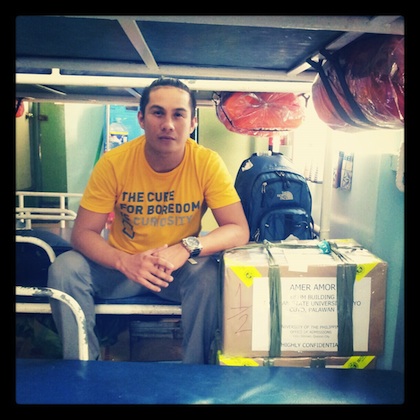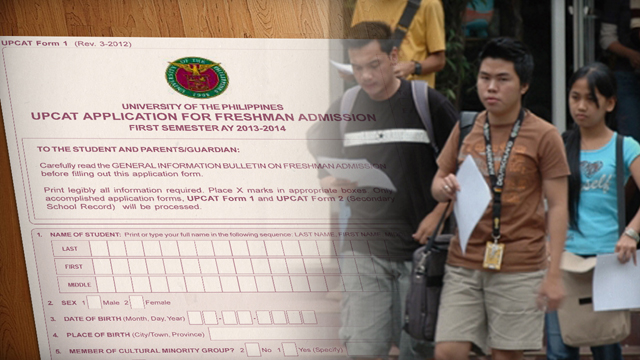SUMMARY
This is AI generated summarization, which may have errors. For context, always refer to the full article.

MANILA, Philippines – Those boxes are far more important than your life.
It is a joke that is shared among regional examiners of the University of the Philippines College Admission Test or UPCAT. While we laugh at how we casually say it, we know it is a tall order. It is an unwritten policy that every regional examiner has kept in mind.
After all, the boxes do not just contain UPCAT test materials. They also contain the future of high school students who could possibly end up in a league that has produced 7 of the country’s presidents, 12 chief justices of the Supreme Court, 34 national artists, and 36 national scientists – all of whom graduated from the University of the Philippines.
That is why we take our “vocation” seriously. Regional examiners, who are a mix of UP faculty members and staff, understand the importance of keeping the UPCAT’s integrity. We will actually do the best we can to protect the boxes and their contents from any untoward incident that might tarnish the credibility of the exam.
During the UPCAT season, which happens every first Saturday and Sunday of August, regional examiners are fielded across the country. From Basco in Batanes to Pagadian City in Zamboanga, and from Cuyo in Palawan to Virac in Catanduanes. We travel by land, air, and sea just to get to these destinations. We endure long, tiring trips and sometimes even risk lives just to get to the communities. This, I believe, is a manifestation of the University’s promise “to make the UP studentry more representative of the nation’s population.”

And those boxes? We literally guard them with our lives. We do not just leave them at the airline’s check-in counters, we actually have to see to it that the boxes are on their way to being loaded on the plane before we proceed to our boarding gates. We do not place them on the bus’ compartments; we pay extra seats for them. If we can help it, we do not just let anyone touch them. We open the boxes only on the day of the exam itself and seal them right after.
When it was my first time to become a regional examiner, I kept a close watch on my box. I was assigned in Digos City in Davao del Sur together with an administrative staff who works at the Office of Admissions in UP Diliman. He has been to so many regional UPCAT assignments before. Even when I was with an UPCAT “veteran,” I took to heart every instruction that went with carrying that box around.
I felt I was accountable for that box. I had to remind myself that any little misstep on my end during our journey will ruin an entire generation’s future. I hugged it while we were on transit, maintained an eye on it while in conversations with other people, and chose to carry it when we got to a chaotic bus terminal even when we could actually just get the service of a porter to carry it for us.
Examiners’ stories
You can imagine what other regional examiners who went before me had to do just to make sure that their boxes get to and from the regional test centers safely and securely.
On our way back from Digos City to Davao City, I fell asleep out of exhaustion from administering the exam that day. I woke up to the sight of an armalite pointed at our box. When you wake up from dreamland with that kind of view, how will you feel? I got scared for a brief moment.
I was even short from panicking until I realized it was actually just a checkpoint. It was a good thing the Office of Admissions had everything carefully planned out for us, I just needed to show the letter from the National Police Commission that exempts the box from routinary security inspections.
In reality, almost every regional examiner has a story to tell. Two examiners got stranded in Batanes for 11 days when a typhoon hit the province in 1997. They had to constantly and painstakingly check on the condition of their UPCAT box when strong winds and heavy rains were batting the island. Far from their families and with their budget depleting, the examiners temporarily turned one classroom into their home.
One examiner speaks of a time when Dagupan City was heavily flooded. They had to traverse the almost waist-deep flood, with their hands up in the air as they carried their UPCAT boxes. Another examiner recalls his assignment in Tawi-Tawi back when UP had a test center there. On their way to their destination, one boat crew told him that they actually have machine guns on their boat as protection against Abu Sayyaf threats. He was, however, more concerned about the malaria scare that was rampant in Tawi-Tawi during that time.
When I learned about these stories and after having experienced for myself the kind of commitment and sacrifice that go with ensuring the integrity of the UPCAT, I felt prouder for passing the exam in 1999. The dedication that every regional examiner extends to their assignment means every test material is safely and securely transported to and from their destinations, leaving no room for leakages and anomalies. Everyone is assured of their fair shot at UP education.
On to Palawan
This year, I am headed to Cuyo in Palawan to administer the UPCAT. Cuyo is the farthest regional test center in terms of travel as one has to fly to Iloilo first then endure at least 14 hours of ferry ride on rough seas. It is also the test center with the smallest number of examinees. Last year, only 19 students took the UPCAT while at least 9 students are expected to take the exam this year.
I specifically requested to be assigned to Cuyo because I feel that Cuyo is a testament to UP’s commitment to make UP education accessible and available to students in far-flung communities (the cost of UP education these days, of course, is a different story).
With its low number of examinees, UP can actually just decide to close this test center down but that would mean passing the burden to the high school students who will have to spend more and endure the rough ride to get to Iloilo and Puerto Princesa, the nearest test centers.
If UP does that, it will mean we might miss out on future national scientists, national artists, and chief justices of the Supreme Court. Who knows the next best Philippine president could have come from Cuyo?
As for that box, it will stay with me in bed for the duration of that grueling 14-hour ferry ride. – Rappler.com
Amer R. Amor is a faculty member of the University of the Philippines in Baguio. He is an UPCAT Regional Examiner.
Add a comment
How does this make you feel?
There are no comments yet. Add your comment to start the conversation.